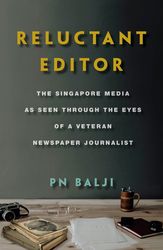In one of the chapters of Reluctant Editor, P.N. Balji writes about a friend, who once visited his home to discuss something sensitive. The friend, who was a lawyer, refused to have the conversation at Balji’s residence, and so he took him out for a walk. “I am sure your home is bugged,” he said. Balji reflected upon the incident in a column he wrote for The New Paper, a tabloid he edited, criticising the atmosphere of fear that prevailed in Singapore.
Soon after the column was published, minister of state for information David Lim invited Balji for lunch, and told him that the fear issue was nothing more than a matter of perception. He then asked Balji what he would do if one of his reporters filed a story about a corrupt minister. Balji said he would check the story and would go to the prime minister for his comments. And, depending on what the PM said, would decide on whether to publish it or not. Lim then told him, “No, you should not publish it. Let the PM investigate and decide what to do.”
The exchange is one of the several instances that show the challenges Balji encountered as an editor. Reluctant Editor tells the story of a generation of gritty journalists who met those challenges and emerged successful.
Balji started off at a time when Singapore began shedding its colonial hangover and set out on a path of economic prosperity at any cost. Freedom of press was never a priority for its founding father, Lee Kuan Yew. The press, in fact, was seen by the government as nothing more than one of its arms, which often came handy in peddling the official position and gauging public opinion, especially on sensitive issues.
Balji recounts one such instance when the government leaked information to the press about an impending hike in bus fares. After the report sparked outrage, the government called it “irresponsible, misleading and rumour-mongering”. Communications minister Ong Teng Cheong called a press conference and asked the editors to reveal their sources. But Peter Lim, the legendary editor of The Straits Times, refused to do so and made a spirited defence of the story and the reporters who broke it. Despite tremendous pressure exerted by the government, he did not even issue an apology. Peter “showed all of us journalists how the media could respond when it felt that it had been unjustifiably reprimanded by the government,” writes Balji. But the repeated run-ins with the government led to his removal from The Straits Times at the relatively young age of 48. Lim, in a sense, was lucky. There were others who were hounded, got their salaries cut and even forced to leave the country.
Balji, however, survived, and thrived, by ‘walking the tight rope’, which could have been another option to consider for the title of his book. He pushed the boundaries, clashed with the government, irritated ministers including Lee, who Balji says was at “his rogue best”. But he knew when and where to stop, and live to fight another day. In Reluctant Editor, he explains in ten lucid chapters how he achieved this feat at the five newspapers where he worked and how the editors of the era stood their ground in defence of their principles.
RELUCTANT EDITOR: The Singapore media as seen through the eyes of a veteran newspaper journalist
Author: P.N. Balji
Publisher: Marshall Cavendish Editions
Pages: 196
Price: SGD 21.50




